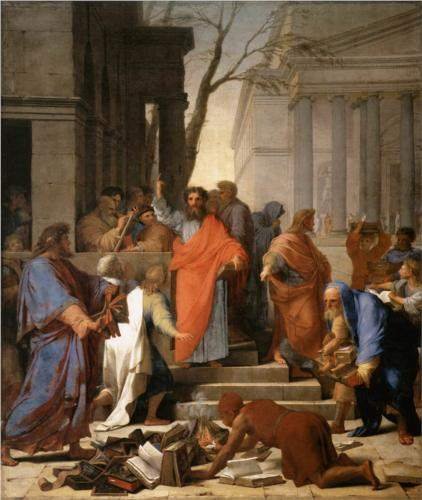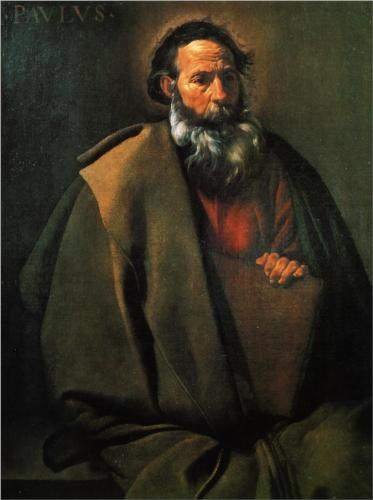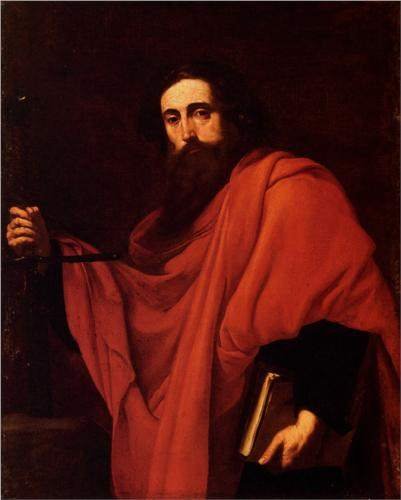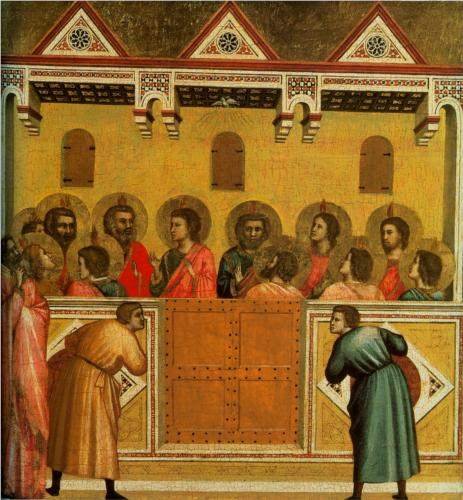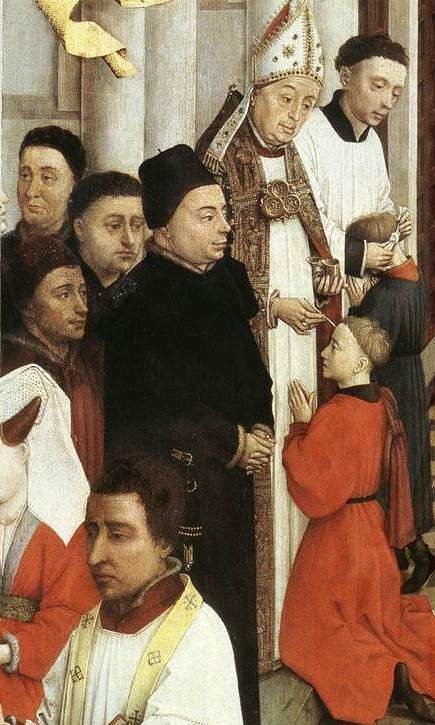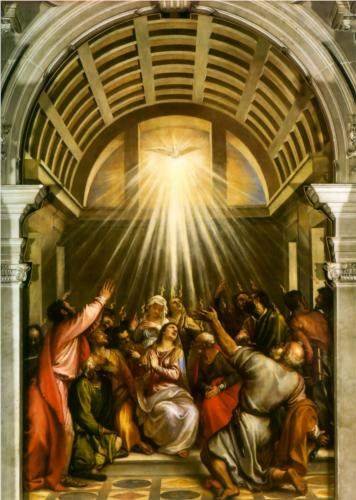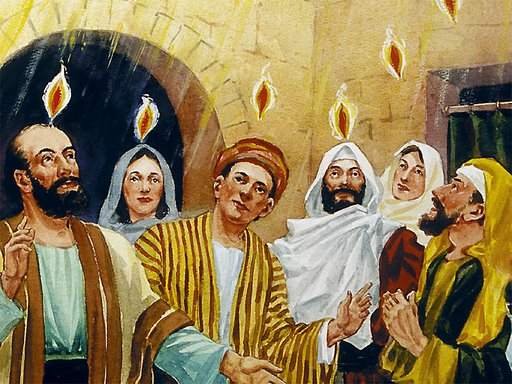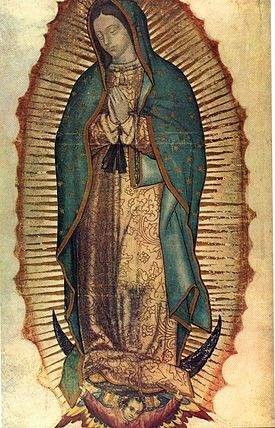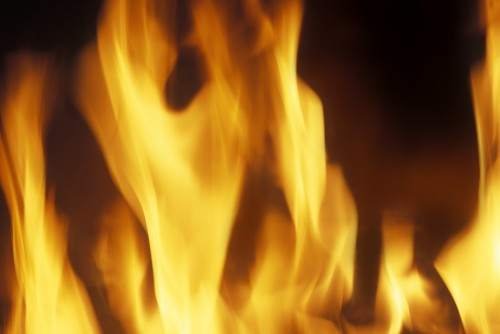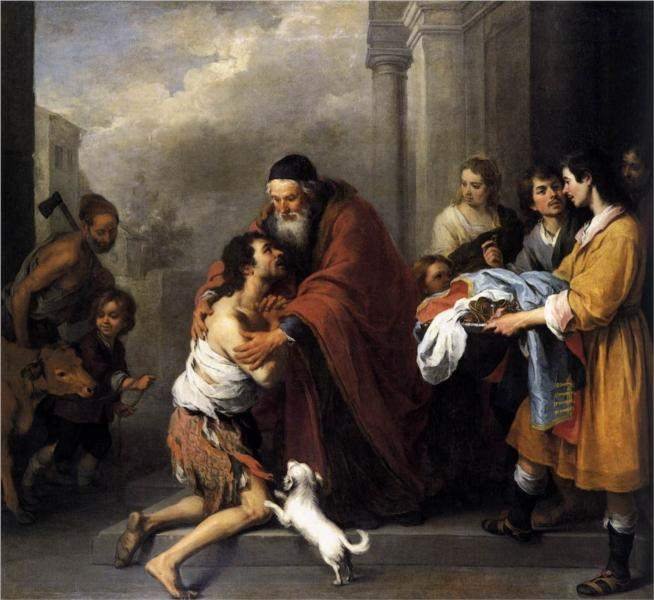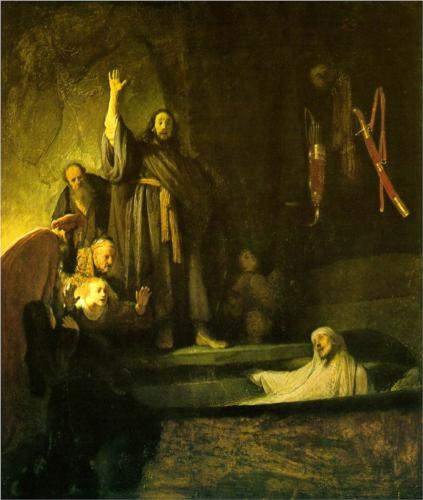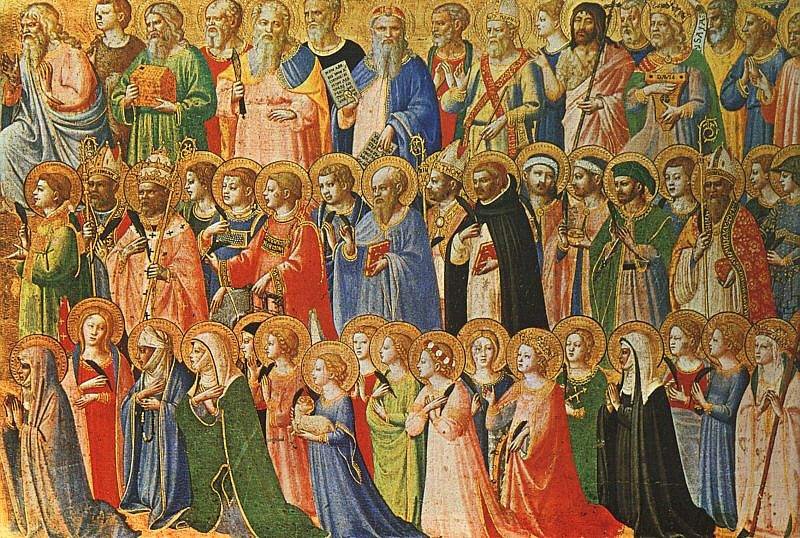
Fra Angelico. The Forerunners of Christ with Saints and Martyrs (about 1423-24).
(This is a post I made earlier this year which seems appropriate for the solemnity of All Saints, updated and revised for the occasion and expanded with some better explanations, since I’ve learned and grown a lot since the original post.)
It occurred to me the other morning in the shower (that’s where thoughts usually occur to me) that many Protestants might be troubled by the concept of saints and sainthood. I have heard Protestants say, “We don’t believe in saints.” I assure you that you do. Do you believe that there are people in Heaven? Then you believe in saints.

The Martyrdom of St. Ignatius of Antioch.
A saint, very simply — in the sense that the Roman Catholic Church (and the Eastern Orthodox Church) declares one a saint, and grants “Saint” as a title — is someone whom we believe, with certainty, is in Heaven with God. That’s all. From Latin sanctus (Greek ἁγιος or hagios), the word means “holy, sacred, set apart.” In biblical usage, as Protestants should be aware, “saints” refers to all the “holy ones,” the believers of the Church. When we state in the Apostles’ Creed that we believe in the “communion of saints,” we are saying that we believe all believers, both those who are living and those who have died, are a part of our Body and share in our communion with Christ. The author of the Epistle to the Hebrews envisions in the Old Testament saints and prophets a “great cloud of witnesses” surrounding us (playing on μαρτυρέω, testify, bear witness, in Hebrews 11:39, and μάρτυρες, witnesses [also the same word as martyrs], in Hebrews 12:1), evoking the image of spectators in an arena as we “run . . . the race that is set before us.” How much more would those who die in Christ join this “cloud”!
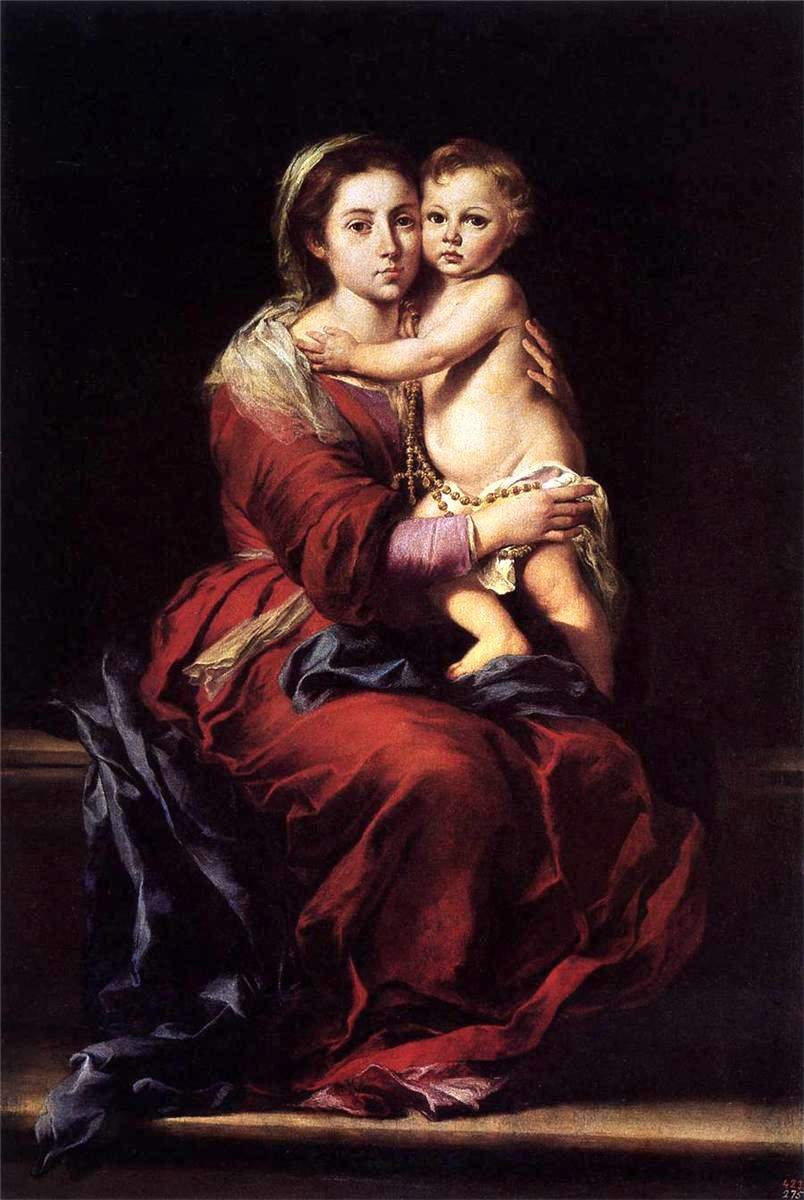
Virgin and Child with Rosary (1655), by Bartolomé Esteban Murillo.
Veneration, not Worship
Catholics venerate saints — we respect, honor, and revere them; we celebrate their memory — because of their great witness and example for us in faith, virtue, and godliness. They are the heroes of the faith whose godly lives we want to remember and whom we want to emulate. They are our spiritual ancestors, our predecessors, our loved ones, the members of our family who have gone to their reward, and yet are still with us in communion with Christ. We do not worship the saints; only God is worthy of worship. We venerate them in much the same way Americans venerate the memory of George Washington or Abraham Lincoln.
Along the same lines: as much as Catholics are accused of “worshipping” the Virgin Mary, let me set the record straight: we don’t. We venerate Mary in the same way we venerate the saints, for she is one, too. For all that we speak of her being mother to the Church and to all Christians, she is one of us: a human person, a Christian — the first Christian — the firstfruits of salvation, who shows forth to us all that we are promised in Christ. Loving and honoring Mary is just a way to love and worship Jesus all the more.

We have an unlimited calling plan.
The Intercession of Saints
So why do Catholics pray to saints? Well, if we believe that they too are part of our communion in Christ, a “great cloud of witnesses,” then why should we be separated from them? They are our friends and family, our brothers and sisters in the Lord who have crossed the river before us. They are already by Christ’s side. Why shouldn’t they pray for us? And aren’t they in a better position for that, to bring our needs and requests before God? Catholics believe that the saints can intercede for us. Praying to saints is nothing more than asking our loved ones to pray for us.

St. Luke the Evangelist, patron saint of physicians. (Simone Martini)
Patron Saints
So what is the deal with patron saints? Well, just as the saints had particular interests and causes and affinities when they were here on earth, they do in Heaven too. A saint is held to be the patron (Latin patronus, protector, defender, advocate, patron — yes, like in Harry Potter) of the profession, activity, nation, cause, or place with which they were associated in earthly life. He or she is held to be a patron against specific diseases, afflictions, and dangers when, through suffering or death, they have gained victory over those things in Christ. And, through tradition, through practice, through trial and error, saints are held to be the patrons of these things because their intercession proves efficacious: because prayers for their aid in those causes work. Saints don’t have magical powers. Saints don’t, in themselves, produce effects on this earth. But by where they are and whom they’re with, they have immense spiritual power to intercede on our behalf.

St. Isidore of Seville, patron saint of the Internet. (Bartolomé Esteban Murillo, 1655).
Relics: What they leave behind
So what about relics? Why the macabre obsession with dead body parts? You may or may not be aware that in most Catholic altars there is a relic of some saint (Latin relictum, that which is left behind or remaining) — usually a small piece of bone or some other body part, but sometimes the whole body, or possibly an object the saint owned or touched. We hold that the person, his or her spirit, is in Heaven with Christ — but that the things which the saint left behind, his physical body most of all, offers a connection, an anchor, a bridge to their presence in that spiritual realm. The idea of placing relics under our altars — or building our churches and altars over their remains, as in the cases of Saint Peter and Saint Paul and many other ancient saints — is that by proximity to these connections, by association with these saints, we can draw as near to Heaven and to God as possible.
The Cleansing Fire of Purgatory
Another thing: Aren’t all Christians who die saints? We do believe that all Christians who die in the grace of God will go to Heaven, yes; but we Catholics also believe in Purgatory — which is not what you might think it is. It is not a place like Heaven or Hell (an idea Dante made popular) but a process. It does not detract from Christ’s victory over sin on the Cross, from His salvation or from His forgiveness of our sins. Everyone who experiences Purgatory has already had his or her sins forgiven, paid in full; he or she will be saved and is promised eternity in Heaven.

But it is the calling of every Christian to take part in the life of Christ’s grace, to live within His Church and Sacraments, to pursue holiness and grace and daily be sanctified and converted (Latin converto, turn towards, change, transform) to Christ’s image. To put it in the terms of Protestant theology: According to Luther and Calvin, justification, the forensic declaration that one is holy and righteous before God, by which Christ’s righteousness is imputed to the believer, is different than sanctification, the process by which the believer is actually made holy and righteous, by living and working in God’s grace. (Catholics believe these are part of the same process.)
Nothing unholy or impure can enter Heaven — so for those of us believers who are not able to finish this process of sanctification, of being transformed, in our lifetimes on earth — and this will be most of us — there is Purgatory, a fire in which we will be purified of our faults and shortcomings and made holy and pure, ready to stand before God (1 Corinthians 3:15, 1 Peter 1:7). If anything, the fire of Purgatory is not a detraction from Christ’s sacrifice, but its fulfillment: He has paid the penalty for our sins, the death we deserve. Purgatory is a tool of His mercy by which even those of us believers who struggle with sin, who are less than perfect, can be saved.
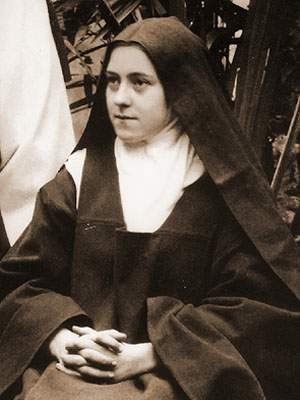
St. Thérèse of Lisieux, the Little Flower of Jesus.
Canonization
Saints, on the other hand, are very special people who, through life in God’s grace, did achieve holiness and become wholly molded to Christ’s image in this life, to the extent that they could as fallen creatures. (Cf. the Wesleyan idea of entire sanctification.) They are people whose godliness is not in doubt, people like the Apostles and St. Francis and St. Thérèse. These days, there are so many very godly people dying that there is a formal process of canonizaton in the Church, through which a person’s sainthood is confirmed and verified, as best as we on Earth can: by asking them for intercession and seeing if those prayers are answered. Two or three miracles associated with a saint’s intercession is the usual standard. A martyr’s death is the saint’s golden ticket to immediate canonization: they pay the price in blood.
Protestant Saints
Are there Protestant saints? You can bet there are. Just because someone hasn’t been formally declared a saint by the Church doesn’t mean they’re not one. Walk through any cemetery, and there are likely to be unknown saints lying all around, people who led truly godly lives and who merited Christ’s reward as soon as they crossed over from this life. Catholics are never in the business of declaring who isn’t or who can’t be saved, or who isn’t or can’t be saints: we believe God, in his infinite mercy, grants His grace and His favor according to His own will.
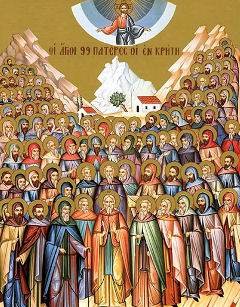
All Saints and All Souls
So what are the holidays that the Roman Catholic Church celebrates on November 1 — All Saints’ Day (or All Hallows’, the origin of Halloween, or Hallows’ Eve) — and November 2 — All Souls’ Day? Well, in the 2,000 years of Church history, there have been a lot of saints, a lot more than the few who get their own universal feast days on the liturgical calendar that are celebrated by the whole Church. There are even more saints who are unknown: everyday holy people who have been sanctified but never attract the attention or veneration of the Church. All Saints’ Day — the Solemnity of All Saints — is the day the Church celebrates all the saints — the many who don’t get celebrated any other day.
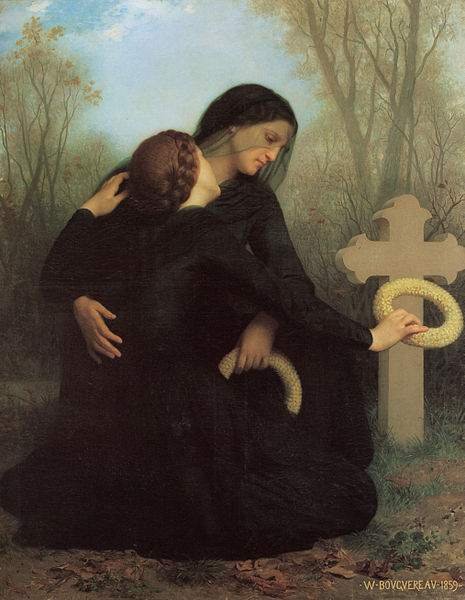
The Day of the Dead (1859), by William-Adolphe Bouguereau.
All Souls is the other side of the picture: our beloved dead in Christ who may not have been wholly sanctified at the time of their passing. Officially called the Commemoration of All the Faithful Departed, it is the day dedicated to remembering them and praying for them, for mercy and grace in their purification and passing to Heaven. We believe that just as we on earth are in communion with the saints in Heaven, we are also in communion with our faithful departed who may not be there yet. We have no idea how long Purgatory takes — it may, as Pope Benedict has reasoned, not be measured in our time at all, but be an “existential” passage that happens in an instant by our reckoning — but we believe, as the Church has always believed, that our prayers for our departed brothers and sisters help them and ease their journey (2 Maccabees 12:46).
May all the saints pray for us, the Church on earth, and may all the souls of our beloved dead pass into the everlasting light!


